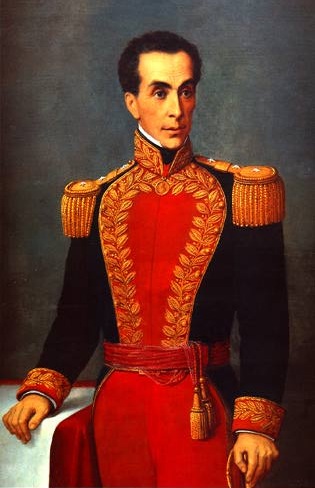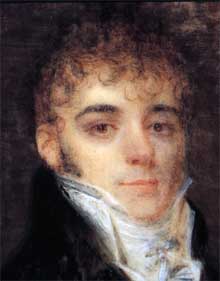He’s been called Spanish America’s answer to George Washington and Thomas Jefferson combined, but Simón Bolívar was both and yet neither. An orphaned child shuttled between distant relatives, he was educated in the principles of the Enlightenment and cut his political teeth watching Napoleon take over most of Europe. He is revered as the Liberator of Spanish America, even though he held most of his compatriots in disdain and eventually declared himself dictator before dying a political failure on his way to exile.
Guest Jorge Cañizares-Esguerra from UT’s Department of History discusses the intricacies of Simón Bolívar, an enigma who is still revered and reviled two centuries after his death.
Guests
 Jorge Cañizares-EsguerraAlice Drysdale Sheffield Professor of History at the University of Texas at Austin
Jorge Cañizares-EsguerraAlice Drysdale Sheffield Professor of History at the University of Texas at Austin
Hosts
 Joan NeubergerProfessor of History, University of Texas at Austin
Joan NeubergerProfessor of History, University of Texas at Austin

Let’s start with a short biographical note. What was Simon Bolívar most famous for?
He was instrumental in ending 300 years of Spanish rule in the Americas at the end of the 18th and beginning of the 19th centuries. He ought to be considered the Spanish American equivalent of both George Washington and Thomas Jefferson.
Like Washington, Bolívar led a people onto the battlefield to gain independence. Like Jefferson, Bolívar drafted constitutions inspired by the ideas of the Enlightenment and the French Revolution.
Yet, Bolívar was neither Washington nor Jefferson. Unlike Washington, who suffered excruciating pain from rotten dentures, Bolívar kept to his death a wholesome set of teeth. More important, Bolívar did not end his days revered and worshiped like Washington. Bolívar died on his way to self-imposed exile, despised by many.
Unlike Jefferson, who admired the ideals of the French Revolution but never actually lived up to them—contradictorily espousing the ideals of freedoms and equality while living comfortably off the labor of hundreds of slaves—Bolívar liquidated all of his plantations and set all of his slaves free.
There are, to be sure, puzzling paradoxes about Bolívar, like Jefferson. He was personally willing to give up all earthly possessions and all comfort during 18 years of military campaigns against Spanish tyranny, but he himself became a dictator. Bolívar was a pragmatist who willingly bent principles in pursuit of strategic goals. This man who allegedly despised Machiavelli was himself a Machiavellian for whom the ends justify all means. He was also a great political failure.
So, where did he come from? What was his early life like?
Bolívar was born in Caracas, Venezuela, in 1783 to a prominent local family of Basque cacao planters. At the time, Venezuela was Spain’s colony. He became an orphan at the tender age of two – his father died when he was two – and his mother died when he was nine. Thereafter, he would temporarily live under the rotating custody of aunts, grandparents, and uncles.
His long term guardians were a philanderer uncle and a black wet-nurse known as la negra Hipólita. Bolívar inherited wealth–plantations and slaves–but also a very loose upbringing and no formal education. He would always be at ease among the poor, the black, and the deviant–prostitutes, for example. He spent his youth moving around households and riding horses. Jumping on and off running stallions, for example, prepared him well for battle, but also may have rendered him infertile; he never issued offspring.
Bolívar grew up to be a planter, an administrator of hacienda peons and slaves in a booming commercial entrepôt – Caracas. So, at age 15, he went to Spain to learn about the workings of commerce and empire.
So, he left Venezuela and went off to Spain-what was his life like in Spain?
In Madrid, Bolívar first lodged with his financially strapped uncles who were at court lobbying for titles of nobility. He soon moved to the house of the Minister of War Council, the Marquis of Uztáriz, a fellow Basque who would become a stabilizing force in his life. Uztáriz hired tutors to educate Bolívar and to help him find a proper match, María Teresa Rodríguez del Toro y Alaiza. Bolívar married María Teresa at age 18, in 1802, and promptly returned to Caracas to tend to his plantations and to his adolescent love nest.
Upon arrival, María died, and Bolívar was left devastated. Her death proved providential.
So, upon María’s death, he went back to Europe? What did he do there?

A grown up in charge of his property and finances at last—he was 18—Bolívar decided to change course and return to Europe to heal. His healing took him to Paris and Rome, where he witnessed the coronation of Napoleon as emperor. He began to think of politics for the first time. For three years—from 1803 to 1806—Bolívar began to familiarize himself with the politics of Europe and the writings of the Enlightenment. He became particularly attracted to the writings of Montesquieu, especially to the notion that laws sprang from the ground up, but could also be engineered from the top down.
He became familiar with the writings of the Romantics, like Rousseau, and their biting critique of the Enlightenment’s dangerous abstractions like the idea that humans and societies were inherently reasonable.
So, at the time that ideas of individual freedom were spreading in western Europe and the North Atlantic, Bolívar had his own perspective on European ideas, is that right?
Yes, indeed. He was very creative and very independent when it came to reading the Enlightenment and the Romantics. Bolívar became a pragmatist and a Classical Republican. That is, skeptical of the principles of liberalism. For Bolívar, the Classical Republican, the interests of the nation—whether the city of Caracas or the entire Spanish-American empire—trumped the rights of individuals, not the other way around as liberals and libertarians would expect.
He also grew critical of Enlightenment ideas of the great potential of human reason. Bolívar proved particularly fascinated with the notion of opinion, that is, the shaping of peoples through culture to go against their own self-interest.
So a kind of early propaganda? Is that right?
Indeed. An earlier view of culture in politics – that you can go against your own self interest.
He also adopted another critique of the Spanish monarchy as a commercially backward tyrannical empire that purposefully kept the people ignorant and oppressed through the power of opinion. At a time when Venezuela had witnessed countless slave conspiracies to gain their freedom, and a failed invasion by the British navy and Bolívar’s compatriot, the glamorous Francisco Miranda (who allegedly was a lover of the Russian empress Catherine), Bolívar returned to Caracas in 1807 to participate in politics.
The opportunity to participate came sooner rather than later in the wake of Napoleon’s invasion of Spain and Portugal. In 1808 Napoleon toppled Ferdinand VII and left the Spanish empire without a king. Cities everywhere in the Americas and Spain elected councils, called juntas, which declared Napoleon and the French enemies—nobody wanted anything to do with Napoleon and the French.
These cities also declared their lasting love for the monarchy. Napoleon’s invasion made evident where the power of the monarchy really resided–namely in the many cities of the empire.
So, how did Venezuela’s powers respond to Napoleon’s invasion of Spain?
The Venezuelan juntas, or city councils, declared each city self-ruling. Autonomous from the new authorities that Napoleon had appointed. Most cities did not seek full independence from Spain or consider a future with no monarchs. It was very difficult to think in terms of a republic. They wanted the monarchy to survive.
Under the leadership of prominent leaders like Bolívar, however, the city of Caracas took a different route. The junta of Caracas began to press neighboring juntas to unite and declare Venezuela an independent republic, which they did in 1810.
So, independent of Spain and a self-governing republic, rather than a constitutional monarchy…
… right. The church and many of the humble poor, including the blacks—who benefited from many of the institutions that the Spanish monarch had created for the free people of color to gain upward social mobility—resented the heavy-handed maneuvering of the junta of Caracas.
The recently created Republic of Caracas soon crumbled down-literally. The earthquake of 1812 destroyed most of coastal Venezuela and sparked an uprising against the oligarchic leaders of the junta of Caracas. As Catholics, the poor and the blacks resented the atheism of the Enlightenment leaders of Caracas as well.
So, we would assume that poor people, common people would like to see a Republic, but in fact they benefited from the monarchy and opposed the Bolívar government…
… right. Very counter-intuitive.
So when this first Republic crumbled, did Bolívar change his mind about Republican government, or about tactics for making Venezuela independent?
Yes and no. Bolívar fled to Cartagena, in today’s Colombia. In his Manifesto from Cartagena, he drew lessons from this failure. One lesson Bolívar drew was that the city council of Caracas had been dominated by liberals, not classical Republicans. That is, those who privileged individual rights over the interest of the community as a whole. Enamored of the attractions of liberalism, including the defense of individual freedoms and political tolerance, the leaders of the city junta of Caracas (according to Bolívar) had allowed conspirators too much freedom to organize. That is one lesson he drew.
The second lesson Bolívar drew was that the chances of Spanish America to gain liberty were rapidly growing dimmer. The wars against Napoleon would soon force thousands of Spanish veterans and persecuted priests to cross the ocean and settle in the New World. Were they to come, Spain could regain America by force and opinion. So, Bolívar urged action. He didn’t learn anything about the poor and the black supporting monarchy.
In Cartagena, Bolívar gained the support of other cities in the interior of Colombia today. Leading a hastily built army, Bolívar crossed the Andes into the highlands of Venezuela and launched a striking campaign advancing from the rear guard–the south–onto the coastal cities of Venezuela. And he defeated the Spaniards again.
The second republic was born. One that, this time, brought the cities of Nueva Granada and Venezuela—Colombia and Venezuela—together. The Republic of 1813, however, was also doomed.
So, things at this time were changing in Europe, too. Soon, Napoleon would be defeated and forced out of Spain. How did that affect what was going on in Spain’s colonies?
In 1814, the Spanish resistance forced Napoleon out of Spain and King Ferdinand VII came back to rule. The monarch decided to put an end to the electoral and constitutional experimentation initiated by the urban city councils of the empire, and decided to send a large army constituted of veterans of the Napoleonic wars to Venezuela and Colombia. The army came and struck an allegiance with the free-colored cowboys from the plains of Venezuela and Colombia who quickly dismantled the new republic.
In 1815, Bolívar had to flee again. This time he fled to Haiti. The visit to Haiti finally opened his eyes to when he needed to bring the poor and the blacks to his sides. This is his pragmatism–this isn’t due to principle, it’s his pragmatism that is moving him to undo slavery. He would have to set free his slaves and offer other slaves freedom through participation in his armies. He would also have to draw a clear line between locals and foreigners in warfare. All Spaniards would be killed. No questions asked.
With the help of the black Haitian government, Bolívar returned to Venezuela to launch a campaign that would last six years, pitted entire populations against each other, and slaughtered tens of thousands. We’re actually talking of a civil war. It was a civil war that gradually destroyed slavery in Gran Colombia, and that put an end to the traditional racial and social hierarchies of Spanish America. These are the unintended consequences of casting the war the way he did. The war empowered mulattoes and blacks, sent the Spanish planters and merchants fleeing, and put at the helm of the army and the state that Bolivar wanted to create upwardly mobile mulattoes.
Unlike Washington, who led wars that, while called a revolution, left most of the social structures of the time intact, Bolívar led wars that profoundly transformed society.
So how did the social structure change then? Did that make governing more or less difficult?
It was a profound revolution. It made the future nations of Venezuela and Colombia ungovernable for most of the 19th century. In Venezuela and Colombia, something similar to what happened in Haiti took place. A revolution from the ground up broke the back of the economies and coastal towns that had been connected to the Atlantic economy and serving it, exporting cacao or exporting other things. Now that all came to an end.
But at the same time, the economy was becoming problematic, but Colombia and Venezuela were both under his political control. Was he content to rule there, or did he want to expand his power?
Bolívar had been defeated twice before this triumph, and he knew that there were pockets of resistance, or armies that would fight for Spain somewhere else. So, once he controlled Colombia and Venezuela in 1822, Bolívar initiated a campaign to sweep the Spanish armies from their strongholds in Peru. In 1823-25 Bolívar led military campaigns that took him all the way into upper Peru, a land of Indians, for which Bolívar single-handedly drafted an authoritarian constitution—a land that, in return, called itself Bolivia to honor the hero.
After his triumphs in Peru and Bolivia, Bolívar basked in adulation. Priests would refer to him in ceremonies as Simon Macabeo, the great Biblical leader of the Israelites against the Babylonian armies. He was also compared to Moses, Joshua, Gideon, and Sampson. Nobody could have compared him to David or Solomon because they were kings, but he was compared to Christ. Bolívar became the libertador–the Liberator–a Christ-like liberator of the people from the idolatry of king worship.
So, he was a great hero despite creating authoritarian governments—or maybe because of creating authoritarian governments. How stable were the governments that he created?
Bolívar tried to maintain the republics that he liberated with his sword and large armies of Indians and manumitted slaves. He tried to keep them united. Yet, beginning in 1826, each city and region began to pull apart. Bolívar convened constitutional congress after constitutional congress to try to stem the tide. He would have himself declared dictator. Yet every effort failed. The Gran Colombia that he created would soon come apart.
Discouraged and dispirited, he left Bogotá in self-imposed exile. He died on his way to Cartagena.

So, he died as a failure after all this great success. What was his ultimate legacy?
Bolívar is an enigma. In all of his writings and all of the addresses to every constitutional congress he assembled to draft laws—and there were many—Bolívar understood his fellow Spanish Americans to be very poor raw material upon which to build prosperous nations. And that it is very odd: he is revered in all these nations now, but if you read his writings, he is so critical of anything and everything in Spanish America that it’s curious. The Spanish Americans were corrupt, in his opinion, lazy, benighted, mentally enslaved by religion and colonial law. Bolívar never lost faith: he would set them free, he thought, either by the sword or the power of the laws. He would teach the Spanish Americans to lead virtuous lives.
Bolívar was a pragmatist, a Machiavellian, a classical republican who privileged the interest of the political community over individual freedoms. Bolívar was an authoritarian from the age of enlightenment, who, ironically was deeply skeptical of the power of reason and sought to shape societies by manipulating culture and public opinion. He put his life on the line in the pursuit of freedom, an abstraction he could never quite define. But he never was clear as to what he meant by freedom.
He never could quite define freedom because he elevated the republic, the community itself above individuals? Is that right?
Right. One of the unintended consequences of all his fighting, all eighteen years of fighting, is that he actually dismantled slavery in societies that were slaving societies, plantation societies. The end result of all this fighting was that slaves were manumitted, slaves were set free through their participation in armies, and that is one of the greatest achievements of his years of fighting, more so than setting these societies free from Spain. Yet, he fought for freedom without actually realizing that his fighting on the ground actually was setting many, many people free. So, he kept on pursuing this abstraction to the very end, and trying to figure this abstraction out in constitutions after constitutions without realizing that he had already accomplished what he set out to do.